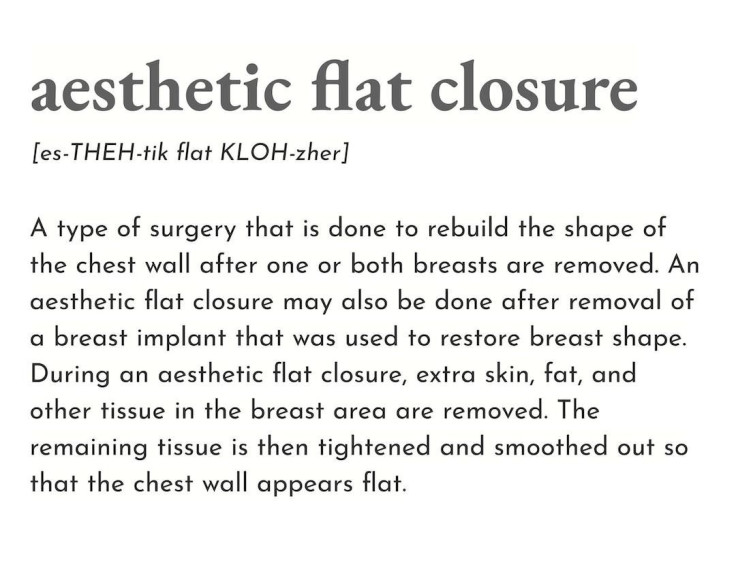Breast Cancer Patients Who Tell Surgeons, "Go Flat," Often Are Ignored

In 2016, Kim Bowles, then 35 years old and a mother of two, was facing the loss of both breasts due to cancer. Going into the surgery Bowles told her doctor she did not want breast reconstruction, instead to leave her chest flat.
Her decision, clearly communicated to her surgeon, was not honored. “I brought photos, I brought a witness, I did everything I could to protect my choice,” said Ms. Bowles, who lives in Pennsylvania. Instead, the surgeon left two flaps of skin in case she changed her mind. Ms. Bowles experienced “flat denial”, the response of a surgeon, who for whatever reason, does not honor a patient's wishes.
Despite the surgeon, Ms. Bowles "went flat" and started an organization called Not Putting On a Shirt (NPOAS), whose primary purpose is to teach women how to tell their doctor they want to be flat, not reconstructed, and to advocated for a women's right to have all the information on all the options available to her.
Research into patient outcomes, historically, found that women who had reconstruction were "more satisfied" either with silicon breast implants or recon Authors of a 2013 survey said women who have had successful reconstructive surgery are “significantly more satisfied” with their decision than those who opted for mastectomy alone.
But what a team from the University of California, Irvine studied seems to be singular.
A new attitude
Deanna Attai, MD, surveyed 931 women who went flat. Dr. Attai found that 74% were happy with their decision. But 22% of these women faced opposition from their surgeon for their choice, who in some cases like Ms. Bowles’ surgeon, left skin for a future reconstruction, just in case. "We were surprised that some women had to struggle to receive the procedure that they desired,” said Dr. Attai in a press statement. Her work was published in the journal Annals of Surgical Oncology.
Flat denial is more than disregard of the patient’s wishes, it can alter the surgery’s outcome. Dr. Attai found that “a high level of flat denial” was the "strongest predictor of dissatisfaction with surgical outcome,” meaning that women who did not feel supported were less likely to feel good about their post-surgery bodies. Notably, women who went to surgeons who specialized in breast surgery generally reported being happier with their outcomes.
According to Ms. Bowles, well-established ideas and beauty standards also drive flat denial. “Women are supposed to have breasts, and that's part of a woman's value,” she said. But, for a woman to appreciate that she is still a whole woman, breasts or not, “is sort of radical.”
Dr. Attai addressed this too, "We found that for a subset of women, 'going flat' is a desired and intentional option,” she said in a press release, “...and should not imply that women who forgo reconstruction are not concerned with their postoperative appearance."

The Impact
Not only does “flat denial”, as Dr. Attai proved, make patients less happy with their outcomes, it can have ripple effects to other parts of life. “It's a serious trauma that happens to women,” explained Bowles, “these are women who are typically either at high risk of breast cancer or are already in breast cancer treatment, they're looking at a future that's filled with medical treatments.” For people like Bowles, and others that have their wishes ignored, there is a toll, “having a medical provider violate your trust in such an egregious manner, it definitely affects you moving forward,” she said.
Holdups and progress
Surgically, going flat requires skill, and doctors who are more comfortable with performing reconstructions might be less confident in a mastectomy alone procedure.
Another issue is that going flat is not an officially designated medical procedure. According to Ms. Bowles, there is no specific medical billing code, and this can pose a problem for surgeons getting paid. “Surgeons that are doing extra work and spending extra time in the operating room to produce a good aesthetic result, they should be compensated,” she explained.
But at least there is an official definition for going flat. In June 2020, the National Cancer Institute, due to lobbying from NPOAS, added a going-flat definition to its dictionary so patients could explain what they wanted. The new term: aesthetic flat closure. An NCI spokesperson said a team comprised of two scientists, two oncology nurses and others found the term to be a relevant addition to the institute’s dictionary.

Currently, there is a proposed bill in Vermont that would revise coding and billing standards. Medical Daily’s request for comment from the bill’s sponsor, Representative Charen Fegard, was not returned by deadline.
Reasons for saying, ‘no reconstruction’
Breast cancer, according to the CDC, is the second most common cancer in women. The women in Dr. Attai's survey were, on average, in their late forties, white, married, and had private insurance. Dr. Attai acknowledged that her survey data were pulled from people who were active in online, going flat communities, which could lead to bias in the data.
Dr. Attai also assessed why women in her study elected to go flat. She found that some women who did so cited the shorter recovery time, while others believed that reconstruction was not necessary for their body image, and others wanted to avoid getting breast implants, for good reason.
In 2019 the FDA requested that Allergan, a breast implant manufacturer, recall some of their implants. The recall was in response to research linking textured implants with implant-associated anaplastic large cell lymphoma, a form of cancer. “The FDA has been diligently monitoring this issue since we first identified the possible association between breast implants and ALCL in 2011," said FDA Principal Deputy Commissioner Amy Abernethy, MD, PhD, at the time, "Based on new data, our team concluded that action is necessary at this time to protect the public health."
Some women worried about an implant have elected for no reconstruction, Ms. Bowles said. "I think there's a growing awareness of the complications of implant reconstruction that dovetails with the increased awareness of aesthetic flat closure as a legit, safe option."
Dr. Attai addressed this too, "We found that for a subset of women, 'going flat' is a desired and intentional option,” she said in a press release, “...and should not imply that women who forgo reconstruction are not concerned with their postoperative appearance."



























